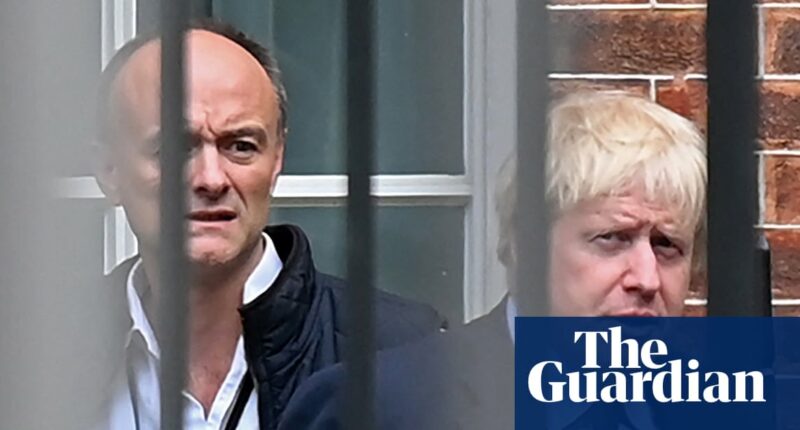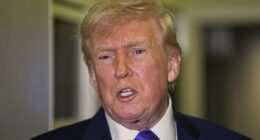Share this @internewscast.com
Heather Hallett’s second report from the Covid public inquiry delivers a stark verdict, summarizing the governmental response to the pandemic as “too little too late.” This extensive 760-page document delves into the crucial missteps and decisions made at the highest levels during the critical months of 2020 and 2021, highlighting the profound impact these had on millions across the UK.
One of the most scathing sections of the report targets former Prime Minister Boris Johnson, criticizing the “toxic and chaotic culture” prevalent within his administration’s pandemic response efforts.
Simon Case, the former head of the civil service, testified to the inquiry, describing how competent individuals were “just being smashed to pieces.” He also highlighted a troubling sexist atmosphere where junior women were often “talked over or ignored.”
There was chaos in No 10
The report directly implicates Dominic Cummings, Johnson’s chief adviser, for significantly contributing to this negative workplace culture. It accuses Cummings of “poisoning the atmosphere in 10 Downing Street” with his “offensive, sexualised and misogynistic language,” featured prominently in his communications.
Giving evidence, the former head of the civil service Simon Case said “good people were just being smashed to pieces”, while others claimed there was a sexist culture where “junior women being talked over or ignored”.
The inquiry found that Johnson’s chief adviser Dominic Cummings “materially contributed to the toxic and sexist workplace culture” and “poisoned the atmosphere in 10 Downing Street”, rebuking him for the “offensive, sexualised and misogynistic language” he used in messages.
Johnson came under fire for not seeking to “restrain or control” Cummings, and for “intentionally seeking to foster conflict and a chaotic working environment”.
The report concluded: “As a result of the poor culture at the centre of the UK government, the quality of advice and decision-making suffered.”
Decision-making was too slow
The report is unequivocal in its conclusions around decision-making and how if leaders had acted quicker, lives could have been saved.
It describes February 2020 as a “lost month” and said that by 12 March 2020 the situation was “little short of calamitous”. If a mandatory lockdown had been imposed a week earlier in March 2020, there would have been about 23,000 fewer deaths, it concluded.
During the second wave in September and October 2020, it said Johnson “repeatedly changed his mind on whether to introduce tougher restrictions and failed to make timely decisions”, and that a second lockdown in England could have been “reduced in length and severity” if he had acted quicker.
The report said that in future emergencies, “interventions must be imposed earlier and ‘harder’ than might be considered ideal”, and recommended central taskforces be created in each nation to help with decision-making.
The Welsh government was also found to have implemented a two-week “firebreak” lockdown too late and lifted measures too quickly, which contributed to a high mortality rate in the country from August to December 2020.
In Scotland, Nicola Sturgeon, the then first minister, was criticised for her overly centralised decision-making process, in which she held “gold command” meetings with a small group of advisers that “reduced transparency” during the pandemic.
On Northern Ireland, the report said a politically divided Stormont executive led to “chaotic decision-making” during the pandemic and the country’s response was “deeply divided along political lines and beset by leaks, leading to an incoherent approach”.
Vulnerable people weren’t protected
The report said several key groups who were more at risk from Covid, such as disabled people and people from some ethnic minorities, were not sufficiently protected owing to a lack of data and policy failures.
The government failed to “act sufficiently speedily to mitigate some risks to disabled people”, the report said, such as by not adding people with Down’s syndrome to the shielded patient list until September 2020.
It also criticised the redeployment of members of the race disparity unit and the government equalities office to help with the pandemic response, even though it was known from April 2020 that people from ethnic minority groups were at a heightened risk of becoming infected.
Messages were confusing
Confusing messaging to the public was a key theme of the report, with Johnson criticised for his “expressions of over-optimism”.
The inquiry found that he had “failed to convey a proper sense of caution, thereby undermining his government’s public health messaging” on some occasions, such as when he talked about how he had shaken people’s hands in hospital the day before launching a handwashing campaign.
after newsletter promotion
The “eat out to help out” campaign, which encouraged people back to bars and restaurants with discounts, “might have contributed to a belief that the pandemic was effectively over, even though the government was aware of the significant risk that there would be further waves of the virus”.
It also said the mantra of “following the science” that was used by politicians throughout the pandemic “downplayed their responsibility for their own decision-making” and suggested scientific advice was being heeded at the cost of all other considerations when that wasn’t true.
Finally the report said that rule-breaking by senior government officials, such as Cummings’ trip to Barnard Castle, “undermined public confidence in decision-making and significantly increased the risk of the public failing to adhere to measures designed to protect the population”.
Politicians didn’t understand the science
The inquiry heard that “many ministers lacked confidence in their ability to understand technical material”, with Johnson in particular singled out for struggling with scientific concepts.
In notes from the time, the government’s chief scientific adviser, Patrick Vallance, said Johnson was “bamboozled” and that watching him “get his head around the stats was awful”.
Ministers often confused “scenario modelling” – which examined the consequences of worst-case scenarios – with forecasts of what would probably happen. This resulted in reputational damage and modellers being considered “over-pessimistic doom-mongers”.
The report recommended a training course on “core scientific concepts” for politicians that could be provided at the outset of an emergency.
There was no support for experts
The inquiry said it was “striking that the burden of providing advice to ministers fell on the shoulders of a few individuals, especially in the devolved nations”.
Scientific experts described their workloads as “excessive” and “relentless”, and the inquiry emphasised how most of them were not paid for their advice, which they had to fit in around their jobs.
They were also subjected to “threats and intimidation” via social media, emails, phone calls and letters. Chris Whitty, England’s chief medical officer, was assaulted in a park in June 2021. His deputy, Jonathan Van-Tam, said he had never expected his family to be threatened with having their throats cut.
The inquiry said there was a “real risk that intrusive media coverage, coupled with online abuse, other forms of malicious communication and physical harassment, will dissuade talented people from contributing to the provision of scientific advice”.
UK should prepare for next pandemic
The report’s recommendations suggested new structures need to be urgently put in place to improve decision-making in any future national emergency.
It said the response to a future whole-system civil emergency should be coordinated by central taskforces in the UK, Scotland, Wales and Northern Ireland, with responsibility for commissioning advice, and there should be more scrutiny of emergency powers such as those used to impose lockdowns.
Other suggestions included better inclusion of experts from the devolved nations in discussions, creating a register of experts who can be drawn upon for scientific advisory groups and creating an online portal for restrictions and guidance in each area.












